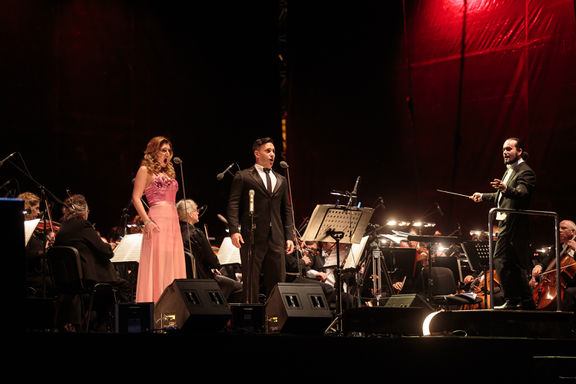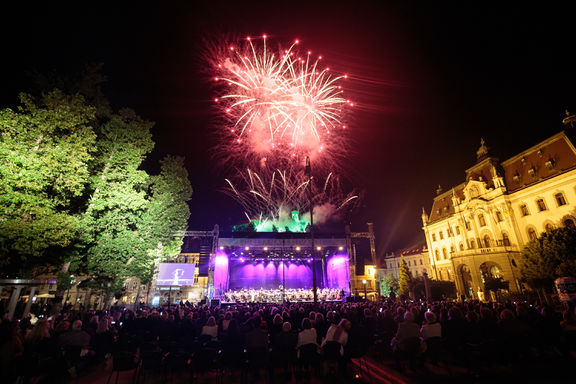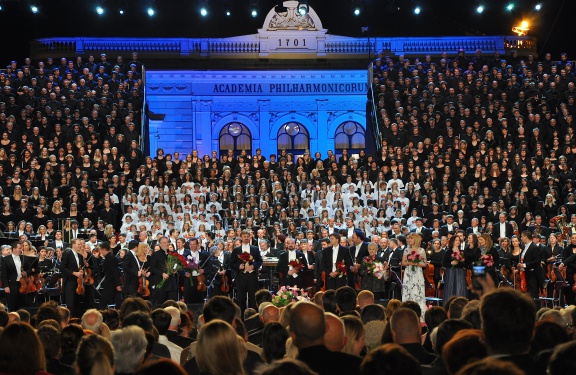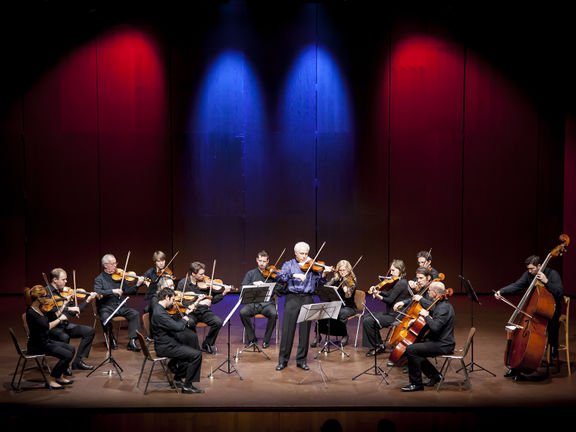Difference between revisions of "Slovene Philharmonic Orchestra"
(frtk!) |
|||
| Line 1: | Line 1: | ||
{{Article | {{Article | ||
| − | | status = | + | | status = |
| maintainer = Gregor Pompe | | maintainer = Gregor Pompe | ||
}} | }} | ||
Revision as of 17:13, 16 July 2012
-
19 Jun 2024
A live performance of Slovene Philharmonic Orchestra with conductor Douglas Boyd and pianist Alexander Gadjiev. The evening's programme includes "Bela krajina", a composition by Slovene composer Marjan Kozina. In collaboration with Embassy of the Republic of Austria in Slovenia, Slovene Philharmonic, Concerts Austria, Columbus, and Go!2025 Nova Gorica.
-
28 Mar 2018
-
to
16 Dec 2017
17 Dec 2017
-
to
28 Jul 2016
29 Jul 2016
A concert by violinists Matjaž Porovne and Mojca Fortin, violist Nejc Mikolič and cellist Klemen Hvala (Slovene Philharmonic Orchestra) interpreting compositions by Aldo Kumar, Benjamin Ipavec and Mozart, accompanying the exhibition by Nadja Zikes organised by the Slovenian Cultural Centre in Berlin (Embassy of the Republic of Slovenia Berlin),
-
to
11 Jul 2015
30 Jul 2015
Croatia Dubrovnik In front of St. Blaise’s Church,Rector’s Palace Atrium,Ruđer Bošković Square
Concerts by the Slovene Philharmonic Orchestra, conducted by Uroš Lajovic, and the Slovene Octet, Dangerous Liaisons and Requiem for 2 Chairs & Stabat Mater, produced by the Slovene National Theatre Maribor, and The Other at the Same Time by Matija Ferlin (Emanat Institute)
at the Dubrovnik Summer Festival
-
24 May 2014
-
to
17 Apr 2014
19 Apr 2014
-
28 Sep 2013
-
28 Apr 2013
-
27 Apr 2013
-
25 Apr 2013
-
24 Apr 2013
-
23 Apr 2013
-
22 Apr 2013
-
7 Apr 2013
-
18 Jan 2013
-
17 Jan 2013
-
30 Nov 2012
Ana Netrebko in Tchaikovsky's Iolanta- a concert with Slovene soloists Monika Bohinec, Nuška Drašček Rojko, Theresa Plut, and Luka Debevec Mayer and the Slovene Philharmonic Orchestra
-
23 Nov 2012
Ana Netrebko in Tchaikovsky's Iolanta - a concert with Slovene soloists Monika Bohinec, Nuška Drašček Rojko, Theresa Plut, and Luka Debevec Mayer and the Slovene Philharmonic Orchestra
-
11 Nov 2012
Ana Netrebko in Tchaikovsky's Iolanta - a concert with Slovene soloists Monika Bohinec, Nuška Drašček Rojko, Theresa Plut, and Luka Debevec Mayer and the Slovene Philharmonic Orchestra
-
8 Nov 2012
Ana Netrebko in Tchaikovsky's Iolanta - a concert with Slovene soloists Monika Bohinec, Nuška Drašček Rojko, Theresa Plut, and Luka Debevec Mayer and the Slovene Philharmonic Orchestra
-
to
3 Nov 2012
27 Nov 2012
Ana Netrebko in Tchaikovsky's Iolanta - a concert with Slovene soloists Monika Bohinec, Nuška Drašček Rojko, Theresa Plut, and Luka Debevec Mayer and the Slovene Philharmonic Orchestra in Stuttgart, Munich, Berlin, Frankfurt, Nuremberg, and Essen
-
to
10 Jul 2012
25 Aug 2012
The Slovene Philharmonic Orchestra; Sophocles's Oedipus the King directed by Eduard Miler; Divine Comedy, choreographed by Edward Clug, music by Milko Lazar and Borut Kržišnik, costumes by Maja Mirković; and Euripides's Medea, directed by Tomaž Pandur (Pandur.Theaters)
at the Dubrovnik Summer Festival
-
9 Jun 2011
Slovene Philharmonic Orchestra with the Kraków Choirs and conductor Daniele Callegari
at the Gustav Mahler Festival
History
The Academia Philharmonicorum (1701) and the Philharmonic Society (1794) were the forerunners of the first Slovene Philharmonic Society which was founded in 1908. The society's orchestra reached an impressive standard under the leadership of Czech conductor Václav Talich, however following Talich's departure its activity declined in the period between the two world wars. The orchestra was re-established in 1947 and was thereafter led by many renowned conductors, among them Bogo Leskovic, Samo Hubad, Oskar Danon, Lovro Matačić, Uroš Lajovic, Milan Horvat, and from 1995 through to 2004 Marko Letonja. From 2005 until 2008 the orchestra was led by American conductor George Pehlivanian, who became the first foreign conductor of the orchestra. He was followed by the French conductor Emmanuel Villaume.
Programme
The Slovene Philharmonic Orchestra performs nearly 40 subscription concerts in the Gallus Hall at Cankarjev dom Culture and Congress Centre per year (it covers two subscription concert series, named by the colours orange and blue). It prepares also concerts on special occasions (a New Year's concert, tours, national celebrations) and musical matinees for young audiences. The Orchestra also has over 40 CD recordings to its credit.
Orchestra plays predominantly standard repertoire of classical music, reaching from classical masters to the great composers of 20th century. It is known for the performances of Slavic music (Dvořák, Tchaikovsky) and monumental symphonic opus of Gustav Mahler. Each year they perform also new pieces by Slovene contemporary composers.
International cooperation
From the late 1970's on, Slovene Philharmonics have toured Europe, USA and Japan many times. During those tours they played in some of the most prestigious venues, as Carnegie Hall (New York City) and Musikverein (Vienna). They played in many musical centres (Vienna, Rome, Florence, Salzburg, Venice, Zurich, Bern, Geneva, Brussels, Madrid, St Petersburg, Moscow, Bucharest, Birmingham), and has also performed at many great international festivals (Wiener Festwochen, Maggio Musicale Fiorentino, Prague Summer, Warsaw Autumn, Dubrovnik Summer Festival, Varaždin Baroque Evenings festival).
Guest performers have included many world-famous artists, including conductors Rudolf Barshai, Serge Baudo, Jiří Bělohlávek, Theodor Guschlbauer, Leopold Hager, Hartmut Haenchen, Heinz Holliger, Dmitri Kitajenko, Carlos Kleiber, Paul Kletzki, Zubin Mehta, Riccardo Muti, Kurt Sanderling, Simone Young and the best Slovene and foreign soloists including Irena Grafenauer, Marjana Lipovšek, Igor Ozim, Dubravka Tomšič-Srebotnjak, Bernarda Fink, Arthuro Benedetti Michelangeli, Boris Berezovsky, Lazar Berman, Sarah Chang, Till Felner, David Garrett, Håkan Hardenberger, Heinz Holliger, Sharon Kam, Zoltán Kocsis, Stephen Kovacevich, Gidon Kremer, Elisabeth Leonskaja, Schlomo Mintz, Anne-Sophie Mutter, Luciano Pavarotti, Ivo Pogorelić, Dezsö Ranki, Vadim Repin, Mstislav Rostropovich, Svjatoslav Richter, Grygory Sokolov, Alexander Toradze and Julian Rachlin.
See also
External links
Gallery
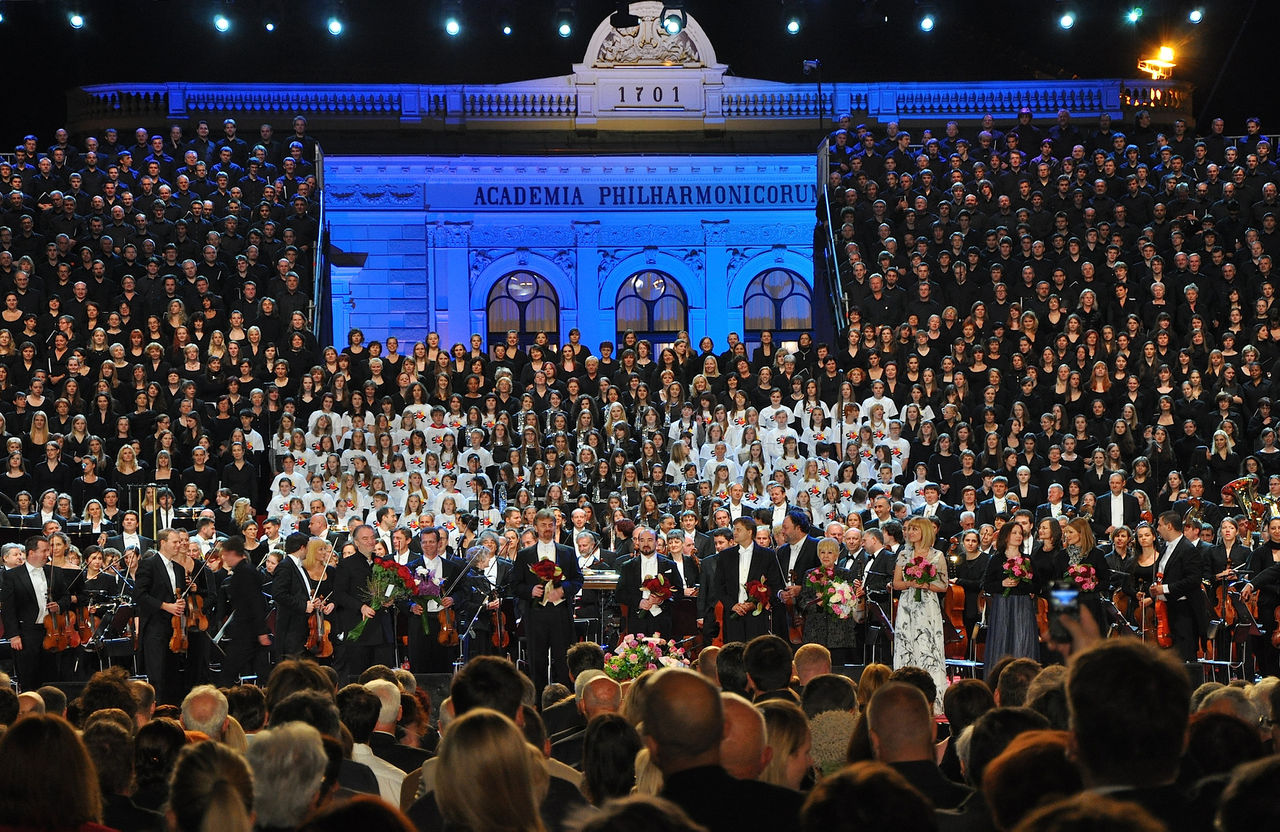 <small class="imgdesc">Gustav Mahler's Symphony No.8, performed by the Zagreb and Slovene Philharmonic Orchestras together with 21 Croatian and Slovene choirs.ether with 21 Croatian and Slovene choirs. +
<small class="imgdesc">Gustav Mahler's Symphony No.8, performed by the Zagreb and Slovene Philharmonic Orchestras together with 21 Croatian and Slovene choirs.ether with 21 Croatian and Slovene choirs. +


